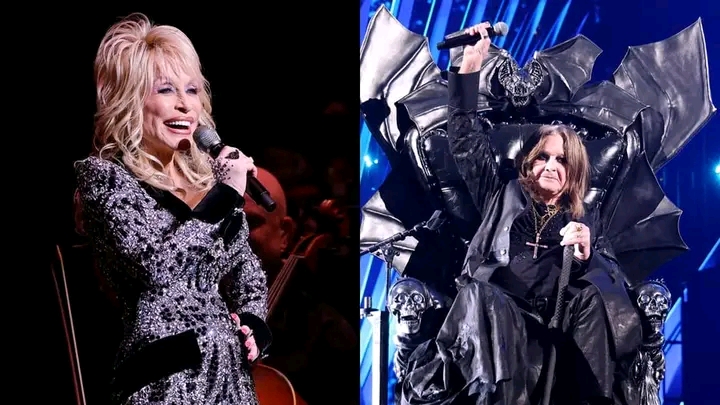Title: Sharon Osbourne Is Everything Men in Power Are — Bold, Strategic, and Ruthless. But She’s a Woman, So You Call It a Problem.
In the entertainment industry and beyond, powerful women are often held to a different standard than their male counterparts. Sharon Osbourne, the fierce matriarch of the Osbourne family and a formidable figure in media and business, is a case in point. She is bold. She is strategic. She is ruthless when necessary. In short, Sharon Osbourne is everything men in power are celebrated for being — yet when she does it, she’s called difficult, dramatic, or dangerous.
So, do I agree with the assertion that society labels Sharon’s traits as problematic simply because she’s a woman? Absolutely.
The Double Standard of Power
Let’s start with the obvious: when men in power — be it in business, entertainment, or politics — show ambition, toughness, and unrelenting drive, they are praised. Think Simon Cowell, Harvey Weinstein (before his downfall), Gordon Ramsay, or even Steve Jobs. These men were — or still are — celebrated for being “tough bosses” or “genius-level perfectionists,” despite stories of explosive tempers or manipulative behaviors.
But when Sharon Osbourne, who has navigated the ruthless entertainment industry, made multimillion-dollar decisions, and rebuilt her family’s legacy from the chaos of rock-and-roll excess, displays those same traits, she’s attacked for them. Her critics use terms like “problematic,” “unhinged,” or “toxic.” This is a textbook example of the gendered double standard in perceptions of leadership and power.
A Woman in the Boys’ Club
Sharon Osbourne carved her name in an industry historically dominated by men — and not just any men, but rock stars. As the manager behind Ozzy Osbourne’s solo career, she turned him into a brand, essentially building an empire from what could have been a washed-up act. She also co-created The Osbournes, one of the earliest reality TV shows, and reshaped the way we view celebrity culture today.
And yet, despite her undeniable contributions to music and television, she’s rarely given the respect afforded to male executives. Instead, media narratives tend to frame her as controversial, combative, or emotionally unstable — traits that, in men, are reframed as passionate or visionary.
The Talk Debacle and the Weight of Expectation
Perhaps one of the clearest illustrations of this bias was Sharon’s 2021 departure from The Talk following an on-air confrontation about race. Regardless of where one stands on the specifics of the incident, what became clear was that Sharon was not granted the space for error or complexity that her male counterparts often are. There was no comeback arc. No rehabilitation through PR-crafted apologies. She was abruptly labeled as part of “the problem” — a swift and decisive fall from grace.
Yet how many men in media have survived worse and returned stronger? The list is long — and telling.
Bold, Strategic, and Ruthless — The Traits of Leaders
Let’s not sugarcoat it: Sharon Osbourne is bold. She makes moves. She speaks her mind — sometimes to her detriment. But these are the same characteristics we are told define great leaders. Her ruthlessness, particularly in the management of her husband’s career, is legendary. But is that not exactly what the entertainment industry rewards? Being cutthroat, tactical, and unrelenting?
Would we have questioned her methods if she were a man with a suit and a title instead of a woman with red hair, attitude, and a thick British accent?
Misogyny in Public Discourse
This is not about Sharon alone. She’s just one of many high-profile women whose ambition is scrutinized more harshly because of their gender. From Madonna to Hillary Clinton, Taylor Swift to Meghan Markle, women who dare to claim space, command attention, or speak authoritatively are punished for stepping out of the submissive mold society still quietly expects.
It’s not that these women are perfect — far from it. But perfection has never been a prerequisite for power if you’re a man. Women, meanwhile, are held to impossible standards, expected to be tough but never cold, assertive but never loud, successful but always grateful.
Conclusion: The Sharon Osbourne Effect
Agreeing with the assertion doesn’t mean Sharon Osbourne has never made mistakes or that her actions should be immune to critique. But it does mean recognizing the bigger picture: that her “problematic” label often says more about societal discomfort with powerful women than it does about her behavior.
Sharon Osbourne embodies the qualities that define leaders across industries. She’s sharp, fearless, and unapologetically ambitious. If she were a man, we’d likely be celebrating her legacy with documentaries, tributes, and think pieces on her brilliance.
Instead, we debate her like a moral conundrum.
It’s time to call that what it is: a problem not with Sharon Osbourne — but with us.
